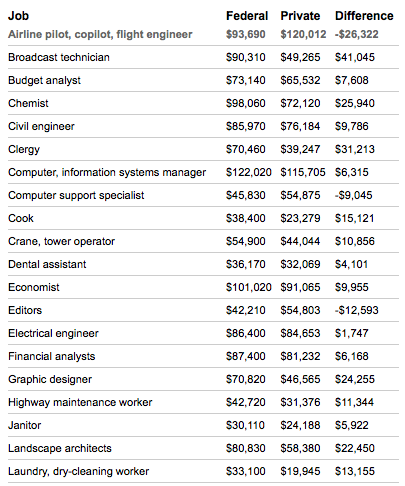Once upon a time (and this is becoming long enough in the past to qualify as legend), government work was less well-paid than equivalent work in the private sector. The advantage of taking the lower-paid government job was job security: government workers had a “job for life” and a nice pension at the end of it. Private sector workers got more in the weekly pay, but generally had worse pensions and more uncertainty for long-term employment.
During the last generation or so, this basic trade-off has been lost. Government workers now get better paid than their private sector counterparts, still get practically guaranteed lifetime employment, and not-just-nice-but-very-nice pensions. No wonder governments have become the employer of choice. Katherine Mangu-Ward has the gory details:
There are two million civilian federal workers. 1.1 million of them have direct private sector equivalents. And they are laughing their asses off at those private sector suckers, who are doing similar jobs for less pay — often a lot less.
“Accountants, nurses, chemists, surveyors, cooks, clerks and janitors are among the wide range of jobs that get paid more on average in the federal government than in the private sector,” according to a USA Today report. In jobs where there are private equivalents, the feds are earning $7,645 more on average than their private counterparts.
[. . .]
Note that the figures above are salaries and don’t include the value of benefits, which averaged $40,785 per federal employee in 2008 vs. $9,882 per private worker.




